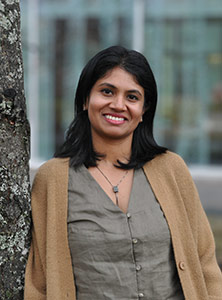Bridging cultures, building trust: New course prepares social work students to serve New Brunswick's diverse communities
Author: Hilary Creamer Robinson
Posted on Nov 20, 2024
Category: UNB Saint John

Taylor McBeath’s journey into social work is a testament to the power of finding one’s true calling through practical experience and education.
Though the first year University of New Brunswick (UNB) bachelor of social work (BSW) student was initially unsure of her path, she always knew she wanted a career in helping others.
After enrolling in arts at St. Francis Xavier University because of her strong interpersonal skills and a family background in teaching, McBeath quickly realized that teaching wasn’t her passion.
After leaving university, McBeath felt a bit lost, unsure of what direction to take. It was during this period of uncertainty that she stumbled upon the Social Service Community Worker program at New Brunswick Community College (NBCC).
“I didn’t really choose this field; it kind of chose me,” she admits.
McBeath saw the NBCC program as an opportunity to continue her education and gain practical experience.
It turned out to be a perfect fit.
With its hands-on and trauma-informed approach, the program helped McBeath understand not only her own experiences but also how to support others who have faced adversity.
“You learn a lot about yourself and your own trauma,” she said.
In the midst of her studies at NBCC, a bridging program with UNB’s new social work program was announced; a game changer for McBeath.
“I could be a social worker in three years. What do you mean?” she recalled thinking.
After completing the NBCC program, she took a year off to work in child protection, gaining valuable insights into the systemic challenges faced by vulnerable populations.
“I got to see how at-risk people continue to be marginalized,” she said.
The experience reinforced her commitment to social work and desire to challenge oppressive systems.
Now, McBeath is thriving in the BSW program on UNB’s Saint John campus, which she finds to be forward-thinking and hands-on.
One standout for her has been Lydia Pandian’s course on intercultural communication and cultural safety.
The course, a requirement for all BSW students, has been instrumental in shaping McBeath’s understanding of the diverse cultural contexts she will encounter in her career.
“Lydia’s course is amazing. It really emphasizes the importance of cultural safety and how to communicate effectively across different cultures,” she said.
Pandian, a McMaster PhD candidate with extensive research on cultural safety and immigrant mental health, developed the course to equip first-year students to engage empathetically and effectively across cultures.

It goes beyond theory, using real-world case studies, anti-oppressive frameworks and experiential learning to prepare students for the dynamic needs of modern social work.
“This course is crucial because Canada is an immigrant community country and New Brunswick is seeing a surge of immigrants,” said Pandian.
“As social workers on the frontline, it is necessary for students to reflect on their own experiences, prejudices and biases when working with individuals, families and communities from different backgrounds.”
The course, developed by Pandian, is both theoretical and highly practical.
Each unit focuses on different communities, including Indigenous and First Nations communities, people of colour, women, immigrants and more. Classes are activity-based, starting with real case studies that students unpack and discuss. Assignments include personal reflections and report writing, ensuring students are well-prepared for the practical demands of social work.
“It’s teaching me that culture is about identity, norms and behaviors, not just race or communication styles,” said McBeath.
She said the course’s forward-thinking approach and emphasis on challenging oppressive systems resonate and remind her to consider how her actions and behaviors could impact future clients.
The program’s experiential learning component will allow McBeath to apply her knowledge in real-world settings, working with individuals from diverse backgrounds.
Pandian said her research highlighted the need for a dedicated course on intercultural communication and cultural safety in social work.
“In my previous experience,” said Pandian, “I saw students struggling with how to approach communities and families from different backgrounds. They needed an in-depth course on communication because social work focuses a lot on talk therapy.”
To provide students with practical insights, Pandian has invited guest speakers from various fields to share their experiences with the class, including Elizabeth Girgg, a researcher in the study of ethics from McMaster University, and Rochelle Maurice, an assistant professor at McMaster University who worked in a neonatal intensive care unit and pediatrics department in a community teaching hospital in Toronto.
The course also addresses the role social media plays in shaping prejudice and communication styles.
“Students often get their information from social media, which influences their biases and the language they use,” Pandian said.
“As social workers, they need to go beyond these biases and think critically about the information they are absorbing online.”
Looking ahead, McBeath hopes to work with at-risk youth and families, building on her passion for relationship-building and hands-on work.
The skills and knowledge she gained from her time at NBCC and now UNB’s social work program, are helping her develop the ability to provide individualized care and build trust with her future clients.
“It’s not just about learning,” McBeath said, “it’s about making a difference."
